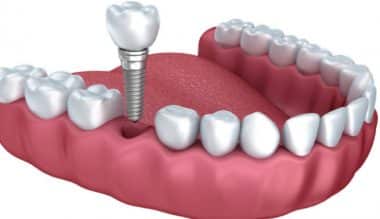Individuals who lost their tooth in any form of accident resort to getting a tooth implant at any cost, especially teenagers who believe they have a whole life ahead of them. Apart from them, there are also people of the older demographic who go for a full mouth permanent tooth implant for healthy and effective chewing. A tooth implant, also known as a dental implant, is a surgical device that is put into the jawbone and allowed to integrate with the bone over time. It’s a synthetic tooth that replaces the root of a lost tooth.
A tooth implant can be a single or full mouth, permanent or removable, whichever one comes with an insurance cost. You could get a tooth implant but you should first know how much it costs to get one.
In this piece, we discussed how much it costs to receive a tooth implant with insurance, whether it’s a complete mouth, single, or permanent implant
How Much Does Tooth Implant Cost
There are no precise costs for a tooth implant. According to Roger Levin, D.D.S., CEO of the Levin Group, Inc., a dental management consultancy, “Implant procedures are complex, and each operation has several aspects, “There are separate fees for each component.” Since no two tooth implant operations are the same—the cost is usually stated as a range.
The following components contribute to the total cost of your new tooth or teeth:
- Comprehensive dental exam, including 3D imaging
- Extraction of problem teeth, if necessary
- Placement of the abutment hardware
- Placement of the crown
- Fabrication of the dental crown
- Installation of the dental implant(s)
The cost of each component is determined by the dental office. As an incentive, several dental facilities provide a complimentary computed tomography (CT) scan at the start of the procedure (the CT scan helps determine your suitability for dental implants). However, if you must pay for the 3D imaging, you could be charged between $350 and $515 for the service.
Overall, implants are a long-term investment and are suitably priced. Levin estimates that the overall cost per tooth, from start to finish, often ranges between $3,000 and $4,500, and a person in need of a mouthful of implants can expect to pay between $60,000 and $90,000.
The fundamental reason for the lack of a consistent price is that no two treatments are the same. “Unlike a single service, such as a filling, implant rates are calculated based on the type and intricacy of the work,” he explains.
In other words, whether you have a CT scan during the preliminary test, whether you need a sinus lift or a bone transplant, and what type of bone graft you need, all determine the ultimate cost.
Another aspect that influences the cost of your dental implants is the location of your practitioner—large metropolitan regions tend to be more expensive.
Summarily, ask ahead of time how much a tooth implant would cost in your specific scenario.
Is Tooth Implant Covered by Insurance Cost?
Yes. Tooth implant insurers have always regarded implants as “elective,” which means that they have not previously paid the costs associated with them. According to Levin, this is changing. “Coverage is getting better. Every year, the amount paid by insurance increases.”
Tooth insurance now only covers a small part of the overall cost of an implant. The percentage of reimbursement may differ depending on the operation. There may also be a monetary limit on reimbursement for a certain calendar year, as well as a lifetime limit for a given procedure.
If you have tooth insurance, you should expect to be reimbursed around $1,500 per implant every single year. You may be able to collect for both years if your implant work spans two calendar years.
Dental implants are covered by flexible spending accounts (FSAs), health reimbursement accounts (HRAs), and health savings accounts (HSAs). These accounts are similar in that they either pay for or reimburse expenses incurred, including the gap between what your insurance covers and what it would cost you from your pocket
Before you begin the tooth implant procedures, however, make sure you’ve verified with your insurance provider or administrator to ensure you fully understand the cost you’ll be responsible for.
Is Tooth Implant Insurance Worth the Cost
Paying the cost of dental insurance in the hopes of receiving coverage for a tooth implant can be worthwhile, but it all relies on your situation and the amount of dental work you require. With yearly maximums on policies as low as $1,000 in certain situations, it’s critical to choose a dental insurance plan that provides enough coverage to aid with the expense of dental implants. Many policies only cover a portion of significant procedures, so you’ll have to pay for the rest of your implant operation yourself.
Having some covering is usually preferable to having none at all. Furthermore, dental insurance can pay for preventive treatment such as cleanings and X-rays, as well as any fillings work that needs to be done throughout the year.
Before you pay for a dental insurance plan, make sure to shop around for the greatest rate. You should look for a plan with a high annual maximum coverage amount, low copayments and out-of-pocket expenditures, and an affordable monthly premium.
How Much Does a Single Tooth Implant Cost
When it comes to dental implants, most patients’ first thought is, “How much does a single tooth implant cost?” Of course, this question is common among patients who want a single tooth implant. There are certain distinctions between the various treatments and the special demands of persons who require dental implants. Furthermore, depending on the terms of your plan, you may be able to get partial coverage for tooth implants if you have dental insurance. While implants are one of the most expensive dental operations, they allow patients to regain full use of a missing tooth while also preserving the supporting bone.
The cost of a single tooth implant ranges between $3000 and $4500 on average. This cost may be well worth it for many people because it creates a tailored, permanent remedy for lost teeth. Even better, there is no increased risk of cavities or complex oral health problems in the future. As a result, you should consider getting it done.
This is the average amount a single tooth implant would cost the patient from their pocket if they do not have dental insurance. Note, however, that the above estimate includes surgery and the initial consultation; however, the cost may vary depending on other factors.
How Much Does Full Mouth Tooth Implant Cost
A Full-mouth tooth implant is durable and secure. They do not require the use of adhesives, unlike regular dentures. When a patient is missing several teeth in a row, a dentist may prescribe this type of implant solution. These implants can only be placed after the teeth have been extracted. The removal of teeth may raise the overall cost of the treatment.
Unlike in single, a full-mouth tooth implant requires replacing not one but all the teeth and as you would suspect, it would cost more. One might ask why would anyone want to replace their whole teeth. Truth is, there are a plethora of reasons one would go for a full mouth tooth implant regardless of the cost. For example, a motor crash or as a result of deterioration of the entire teeth, or perhaps, just a choice.
You may also ask how much does it cost to get a full mouth tooth implant. We answered that right here.
There is a wide variety of costs for a full-mouth tooth implant due to the many procedures. A full mouth tooth implant typically cost around $34,000. While a top or bottom pair of dentures can range in price from $3,500 to $30,000.
Implant-supported dentures are a less expensive option, in which two full arches of artificial teeth replace the natural upper and lower teeth (after any remaining teeth are removed), just like non-implant-supported dentures. The arch is held in place by four to six implants in each of the upper and lower jaws. This option, often known as All-on-4, typically costs between $24,000 and $50,000 for a complete set.
Benefits of Tooth implant
Aside from the cost that is associated with it which some patients might view as expensive, a tooth implant has its benefits regardless. In addition, tooth implants do not necessitate the purchase of any special cleaning or care products. There is no need for cups, cleaning tablets, adhesives, or specialized flossers. You simply brush and floss your teeth as you would with normal teeth. Below are some of the other benefits of tooth implants
#1. Bite Force is restored
Dental implants, which are secured into your jaw with a titanium post that replaces the tooth root, allow you to bite with roughly the same amount of force as you would with natural teeth. Because they sit on top of the gums and aren’t fastened in place, other tooth replacement choices don’t return nearly as much of your bite power.
#2. Prevents changes in your face’s shape
Your teeth serve to support the structure of your face. When you lose your teeth, you lose that support, which causes your face to shift form and makes you look older. A tooth implant saves you the cost of looking older by supporting your face in the same way as natural teeth do, keeping it from shifting shape.
#3. Prevents bone deterioration
When you lose teeth, you lose bone mass in your jaw as well. To retain its mass, the jawbone requires the stimulation that occurs when your teeth meet. Dental implants are the only tooth replacement option that also replaces jaw bone stimulation, which aids in bone preservation.
#4. Identical to Your Natural Teeth
Dental implants are available in a variety of shapes and sizes. Your dentist will collaborate with you to create implants that are the same colour as your neighbouring teeth and fit properly in the gap. Only you and your dentist will be able to tell which teeth are implants. Isn’t that amazing!
#5. Complies to Adjacent Teeth
A missing tooth can cause the teeth on each side of the gap to shift places, resulting in misalignment. Dental implants bridge the gap, helping you to keep your smile straight and even.
#6. Allows for Natural Speech
Some tooth implant solutions, such as dentures, can impair your ability to correctly enunciate words. As missing teeth might also cause problems with your speech, dental implants allow you to talk freely and naturally since they feel and function exactly like real teeth.
#7. Will Not Get Cavities
Lastly, there is no risk of cavities. Artificial teeth still require maintenance to prevent bacteria from accumulating in your mouth and causing illnesses, but the material used to make dental implants cannot rot. You’ll never have to be concerned about cavities in your dental implants!
Is a dental implant worth it?
The price of the process is frequently just a little bit greater than that of more conventional dental procedures. In the long term, dental implants are a cost-effective choice since they offer a permanent alternative to missing teeth. And a wise investment for those who wish to keep oral issues at bay in the future.
How painful is getting a dental implant?
In the first 24 to 48 hours after surgery, a simple dental implant for a patient with healthy bones and minimal soft tissue surgery has a pain level between 2 and 3, so Tylenol or Advil will take care of any discomfort they may be experiencing.
Is a dental implant worth it?
The price of the process is frequently just a little bit greater than that of more conventional dental procedures. In the long term, dental implants are a cost-effective choice since they offer a permanent alternative to missing teeth. And a wise investment for those who wish to keep oral issues at bay in the future.
How painful is getting a dental implant?
In the first 24 to 48 hours after surgery, a simple dental implant for a patient with healthy bones and minimal soft tissue surgery has a pain level between 2 and 3, so Tylenol or Advil will take care of any discomfort they may be experiencing.
How long after pulling a tooth can you get an implant?
Generally speaking, you must wait at least 10 weeks after having a tooth extracted in order to have dental implants inserted if you intend to receive them. After the surgical tooth extraction, the mouth can heal throughout this waiting period. There are, of course, always exceptions.
Can dental implants be done in one day?
In one day, a dentist can perform the All-on-4 treatment and put the implants and affix a temporary denture to them. After several months, a permanent denture is attached. After the placement operation for various implant procedures, there is typically a recovery period of several months before any restorations are placed.
Summary
When it comes to repairing missing or damaged teeth, you have a few alternatives. Dental implants, on the other hand, stand out among the others. Other tooth replacement choices, such as dentures or bridges, cannot match the benefits of dental implants.
Related Articles
- How much Does Braces Cost In Texas, Florida, Michigan & Across The US (Detailed Guide)
- SMILE BRANDS INC: Overview and Benefits
- How to Save Money on Dental Equipment and Supplies
- Top 20 Skilled Trades for Women in 2023: Salary and Prospect
- How Much Do Braces Cost A Month With Or Without Insurance (Detailed Guide)
Frequently Asked Questions
How long does a tooth implant last
For decades, tooth implants have been used successfully. In fact, the first patient to receive modern implants wore them for 40 years before dying! Your implants should last a long period, anywhere from 25 years to a lifetime.
Are tooth implants safe
While the implant technique is considered safe, implant installation is a surgical operation. There are dangers associated with this operation, as with any surgical procedure. While the danger of infection or rejection exists, the percentage of patients who experience issues as a result of implant surgery is quite low.
Do tooth implants hurt
For most patients, dental implants hurt after the anesthesia wears off, and after the procedure is done. However, such tooth implant pain can be managed by taking a locally available pain killer
Doest tooth implant feel natural
Because a dental implant replaces a lost tooth, you have no sensation in the implant itself. Any sensation you have is caused by the gum tissue that surrounds you. That is, the implant will not feel exactly like your natural tooth.
Are tooth implants strong
A dental implant’s biting strength is typically 80- to 90-per cent that of a natural tooth. If you’ve ever had dentures, bridges, or weak/diseased teeth, you know how important a solid bite is.







1 comment
Interessant, dass Zahnimplantate die einzige Zahnersatzoption sind, die auch die Kieferknochenstimulation ersetzt, die den Knochenerhalt unterstützt. Am liebsten würde ich mir auch für meinen Kiefer ein neues Zahnimplantat einsetzen lassen. Am besten vereinbare ich ein Beratungstermin beim Zahnarzt für eine Implantat-OP.